Trump says Iran involved in Gaza hostage talks
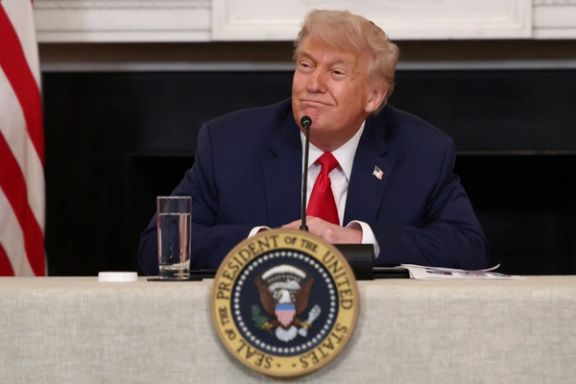
US President Donald Trump said on Monday that Iran is involved in negotiations aimed at securing a ceasefire and the release of hostages between Israel and Hamas in Gaza.

US President Donald Trump said on Monday that Iran is involved in negotiations aimed at securing a ceasefire and the release of hostages between Israel and Hamas in Gaza.
“Gaza right now is in the midst of a massive negotiation between us and Hamas and Israel, and Iran actually is involved,” Trump told reporters at the White House. “We want to get the hostages back.”
Trump gave no further details.
The US has proposed a 60-day ceasefire in Gaza. Israel has accepted the plan, while Hamas has not agreed. The proposal includes the release of 28 Israeli hostages, both living and dead, in exchange for 1,236 Palestinian prisoners and the remains of 180 Palestinians.
Separately, Trump said talks with Iran on its nuclear program were continuing but differences remained. He said Iran wanted to continue enriching uranium, which the US opposes.
“They seek enrichment. We can’t have enrichment,” Trump said.
Earlier on Monday, Iran’s foreign ministry said it would soon present a counter-proposal to a recent US offer, which it has called unacceptable.
Trump told reporters he expected the next round of discussions to take place on Thursday. However, Spokesperson Esmail Baghaei later said the next round of indirect negotiations was being planned for Sunday in Muscat.
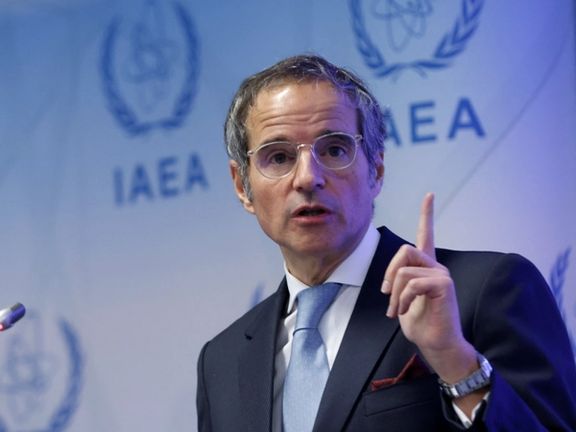
An Israeli strike on Iranian nuclear sites may push Tehran toward pursuing a bomb, International Atomic Energy Agency (IAEA) chief Rafael Grossi told Israeli news channel i24News.
Such an attack "might have an amalgamating effect which would make a determination on the part of Iran to go to a nuclear weapon or to abandon the treaty on non-proliferation. I’m telling you this because they have told me,” Grossi said.
The IAEA chief emphasized the difficulty any military operation would have of destroying Iran's nuclear capabilities.
“Certainly this program runs wide and deep. And when I say deep, I know what I’m saying. So many of these facilities are extremely well protected. This would require a very, very devastating force to affect it.”
The United States and Iran are locked in high-stakes negotiations over Tehran's nuclear program, and US President Donald Trump has mooted an attack if they fail.
Israel struck multiple targets inside Iran in October and has repeatedly vowed to deny Iran a nuclear weapon, which it views as an existential threat.
Tehran denies seeking nuclear weapons but its arch-nemesis Israel and Western countries doubt its intentions.
Grossi said Iran needed to the let the nuclear watchdog do its job by allowing more inspection and explaining past behavior.
"I am in a constant dialog, especially with the foreign minister (Abbas) Araghchi," Grossi said. "(They say) they have nothing happened. If this is the case, then they should allow us to do our job and to get as much access as we can."
Western powers may push for a resolution finding Tehran non-compliant with its nuclear non-proliferation obligations at the upcoming quarterly meeting of the IAEA Board of Governors this week.
Iran has warned of an unspecified strong response to any such move and has accused the IAEA of being swayed by its Western adversaries.
The United States accused Iran of seeking a nuclear weapon as part of the shadowy Amad Project scrapped in 2004, an effort Washington says was overseen by Iran’s Organization of Defensive Innovation and Research.
"There are areas of real concern and we need to get to the bottom of a number of things," Grossi said, without referring to any specific issues.
"Over the past few years ... we discovered traces of enriched uranium in places that were not supposed to be having any nuclear activity. So my question here - this is not an accusation - It's just a very logical question: if we found these traces there, what was going on?"
The IAEA would likely play a central role in verifying and overseeing any nuclear agreement between Iran and the United States, as it did with an international deal US President Donald Trump scrapped in 2018.
Hawks in Israel and the United States have said Iran's lack of full disclosure on past activities calls into question its commitment to any future deal.
"For years ... we have been getting some answers, and these answers have not been satisfactory," Grossi added. "Please do not believe that we are naive."

Iran’s Supreme National Security Council issued a warning on Monday that any Israeli attack on Iranian nuclear facilities will be met with a direct response targeting Israel’s concealed nuclear infrastructure.
Iran’s state broadcaster IRIB reported on Saturday that Iranian intelligence services had obtained a large cache of sensitive material from Israel, including documents related to the Jewish state's nuclear and strategic facilities.
The intelligence operation yielded a “significant intelligence achievement,” the Supreme National Security Council's said in a statement, adding that a detailed database of Israeli targets is now at the disposal of Iran’s armed forces.
“In the event of aggression, the (Israeli) regime’s hidden nuclear facilities will be targeted,” the statement said.
The council emphasized that this intelligence gain was part of “a smart, quiet strategy” by the Islamic Republic in response to what it described as hostile media and political pressure.
It further praised what it described as "the tireless and unassuming efforts of the armed forces aimed at building operational capabilities tailored to the weaknesses and strengths of the Zionist occupying regime (Israel) and its supporters."
Iran's intelligence and operational readiness, the statement added, now allows Iran’s forces to immediately retaliate not only against nuclear threats but also against any act of sabotage targeting Iran’s economic or military infrastructure.
Iran’s intelligence minister said on Sunday the documents will soon be made public. However, Israeli security experts have cast doubt on Tehran’s claims of obtaining sensitive Israeli intelligence as exaggerated or psychological warfare.
Asher Ben-Artzi, a former head of Israel’s Interpol, told Iran International, “I know that the relevant information is well-guarded in Israel and it does not seem to me that hackers can access it."
He warned that the intelligence may not be as significant as claimed. “Iran wants to tell the world that their intelligence personnel are professionals, but they probably think that their use of disinformation will increase their achievements,” he said.
In 2018, Israel said it had stolen Iran's nuclear documents including 55,000 pages and 55,000 digital files from a warehouse in Tehran's Shourabad area through an intelligence operation.
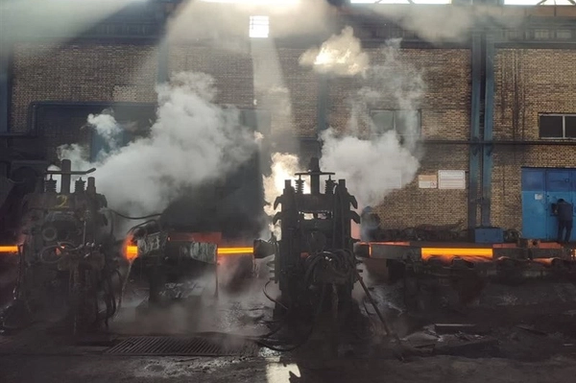
An Afghan worker was killed and seven others injured following the explosion of a gas tank at the Sharif Khaledabad Steel Complex in Natanz, a city in central Iran which houses the country's main uranium enrichment facility.
Local emergency officials confirmed the incident occurred on Sunday, resulting in the immediate death of one worker who was a national of Afghanistan.
The seven others who were wounded in the blast were promptly transferred to a nearby medical facility for treatment. No further details were released regarding the extent of their injuries.
The acting head of the Natanz Emergency Services said the precise cause of the explosion remains under investigation. Authorities are continuing their inquiry into the circumstances surrounding the incident.
Natanz is primarily known as the site of Iran's main uranium enrichment facility. The facility, officially known as the Shahid Ahmadi Roshan Nuclear Facility, is a key component of Iran's nuclear program.
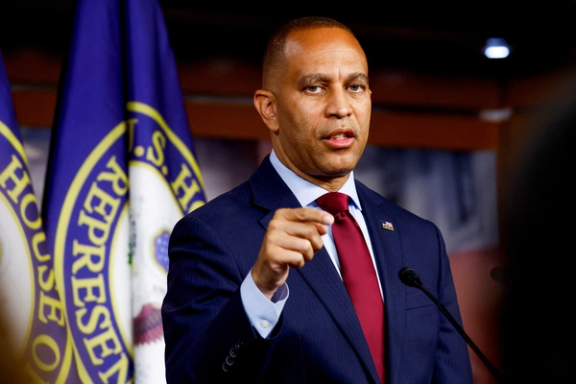
Democratic lawmakers on the sidelines of the Trump administration's high-stakes nuclear talks with Iran largely hope for their success but lament being cut out of a process playing out behind closed doors.
While hawkish Republicans and a lone Democratic Senator John Fetterman have vocally questioned Iran's nuclear intentions as Trump has pushed for harsher terms, mainstream members of the caucus have mostly kept mum.
Trump in 2018 exited an international deal inked under Democratic President Barack Obama, much to the party's consternation, but its leadership has signaled cautious backing for a new stronger deal.
House Minority Leader Hakeem Jeffries last week blessed the diplomatic effort but questioned why Congress was not being briefed.
"With respect, we don't have a great deal of visibility into what President Trump is trying to accomplish in terms of the current negotiations with Iran," the New York representative said.
"Iran should never be allowed to become nuclear capable, and ... (a deal) should be longer and stronger than what had previously existed, and should be done in a manner that is verifiable and resilient."
Jeffries told Iran International "that a future agreement must be stronger than its predecessor—enforceable in a lasting way, with real consequences for violations.”
The crux of the dispute in talks appears to center around enrichment. While Obama's deal allowed limited uranium enrichment on Iranian soil, a toughened line by Trump's negotiators demands a total halt - a scenario Tehran has repeatedly rejected.
Senator Chris Murphy, a Connecticut Democrat who sits on the Senate Foreign Relations Committee, was more critical of the administration's handling of the key foreign policy issue.
"As far as I know the administration has provided zero briefing to this committee on the negotiations, so they seem to be happening totally in secret," Murphy told Iran International.
"I think that's pretty dangerous for the American people to be kept in the dark about these negotiations, especially really sensitive negotiations that involve a potential nuclear war," he added.
Democrat maverick
Republicans, by contrast, who appear to have no more formal briefing than their counterparts across the aisle have consistently expressed in news interviews and social media posts a reticence to trust Iran in a new agreement.
Perhaps the harshest line on Iran has been taken not by Republican but by Democratic Senator John Fetterman of Pennsylvania, a strident advocate of Israel who suggested on X last week that Washington should bomb its way out of the Iran impasse.
His remarks hinted that Iran's highly enriched uranium stockpile should be hit with a US bunker-buster bomb.
While bellicose Republican rhetoric toward Iran is familiar territory, a sitting Democrat openly advocating for preemptive military action is almost unprecedented in the post-Iraq invasion era.
According to an aide close to Fetterman who spoke to Iran International on condition of anonymity, he views Iran’s nuclear program as a “ticking time bomb.”
Fetterman, the aide added, believes any delay in confronting Iran militarily could leave both the United States and Israel with fewer and riskier options in the future.
An Israeli preemptive strike would be a “once-in-a-generation opportunity” to, in his words, “obliterate” the Islamic Republic’s nuclear ambitions.
The emergence of Fetterman’s hawkish line has intensified long-standing tensions within Democratic ranks over the use of military power and America’s strategic posture in the Middle East.
For Democrats, Fetterman’s rhetoric adds a new layer of complexity as the party seeks to re-establish a distinct foreign policy identity in opposition.
While they seek to articulate a position that contrasts meaningfully with the Trump administration, avoiding internal fragmentation or policy incoherence will be key.
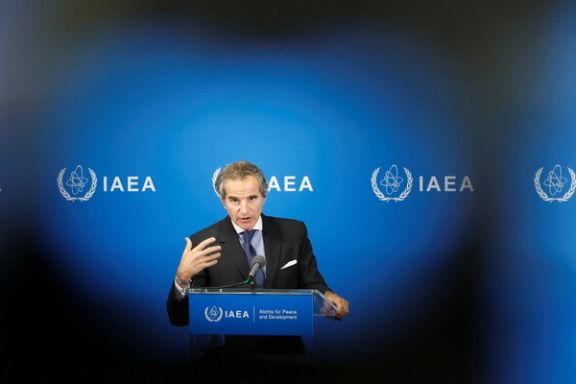
The head of the UN nuclear watchdog said on Monday that a draft resolution put forward by Western powers censuring Iran for its nuclear non-compliance is separate from the indirect talks between Tehran and Washington.
“There is no formal link between one thing and the other,” said Rafael Grossi, Director General of the International Atomic Energy Agency (IAEA), at a press conference after the agency’s Board of Governors opening meeting in Vienna.
“But it is obvious, I think for all of us, that there is an interrelation and perhaps a mutual influence. Not perhaps—for sure. It is a mutual influence.”
Grossi emphasized that the draft resolution—tabled by the United States, France, Germany, and the United Kingdom—should be viewed as part of the agency’s technical oversight role, not as a political manoeuvre aimed at pressuring Iran as Tehran alleges.
Earlier in the day, Mohammad Eslami, head of the Atomic Energy Organization of Iran (AEOI), accused the IAEA of acting under American influence and said the agency had lost its credibility.“We have no hidden program and no deviation from our obligations.”
AEOI spokesman Behrouz Kamalvandi also warned of specific countermeasures. “Last time we warned them and they didn’t listen, so we increased 60 percent enrichment sevenfold. Now again, we’ve told them what actions we may take,” he said in a broadcast. “The agency shouldn’t expect continued constructive cooperation.”
Iran views the potential censure resolution at the IAEA Board of Governors as a politically motivated step that could be exploited by the E3 to push for a Security Council move triggering the snapback mechanism, which would reimpose UN sanctions lifted under the 2015 nuclear accord.
JCPOA no longer sufficient as Iran advances program, IAEA chief says
Grossi said that even if revived, the 2015 deal—formally known as the Joint Comprehensive Plan of Action (JCPOA)—would no longer be enough to address the scale and complexity of Iran’s nuclear activities.
“The JCPOA was designed to be applied to a very specific type of Iran program, which is completely different now,” he said. “Even if you wanted to revive it, it would not be enough because now they have new technologies.”
He added that the agency’s technical work must continue regardless of the political track. “We cannot wait for negotiations. We are an independent technical body. But if diplomacy succeeds, it will help reinforce cooperation.”
Highly enriched uranium ‘cannot be ignored’
Grossi stressed that while uranium enrichment is not prohibited under international law, the levels Iran is reaching are a serious concern.
“Uranium enrichment per se is not a forbidden activity, which is something my Iranian counterparts always tell me,” he said.
“At the same time, when you accumulate and continue to accumulate, and you are the only country in the world doing this at a level very, very close to what is needed for a nuclear explosive device, then we cannot ignore it.”
“There is no medical or civilian use for it,” he said. “That is why it is important for us.”
Iran obtaining IAEA documents undermines cooperation, Grossi says
Iran’s possession and analysis of confidential documents from the agency is a “bad” development that undermines the cooperative relationship expected between Tehran and the IAEA, Grossi said without elaborating on the documents.
A confidential IAEA report dated May 31 said that the agency had obtained “conclusive evidence of highly confidential documents belonging to the Agency having been actively collected and analyzed by Iran.”
“This dates to a few years ago, but we could determine with all clarity that documents that belong to the agency were in the hands of Iranian authorities, which is bad,” Grossi told reporters. “We believe that an action like this is not compatible with the spirit of cooperation.”
IAEA working to calm threat of Israeli military action
In response to a question about the possibility of Israeli military action on Iran’s nuclear program, Grossi said the agency is actively seeking to de-escalate the situation.
“We are trying to solve this without the use of violence or force,” he said. “If it’s done correctly, thoroughly, with a very strong verification and monitoring chapter from us, it would give the necessary assurance for Israel and for the world that there is nothing to be feared coming from there.”
Grossi said Israeli concerns were not new, but said the IAEA's focus remains technical. “We are trying to get to a solution in a diplomatic way, trying to clarify and solve this.”
No communication on Iran’s claim of seized Israeli documents
Responding to a question about reports that Iran has obtained sensitive data on Israeli nuclear activities, Grossi said the agency had received no official communication regarding the claims.
Grossi added that "This seems to refer to Soreq [nuclear center] which is research facility which we inspect by the way,” —suggesting that the documents Iran says to have accessed may relate to this site.
Contrary to popular belief, Grossi emphasized that the IAEA does inspect certain parts of Israel’s nuclear program.
“Normally people tell me, ‘you don’t inspect Israel.’ Yes, we do... We don’t inspect other strategic parts of the program, but we do inspect Soreq,” he said.
Iran’s state broadcaster IRIB reported on Saturday that Iranian intelligence services had obtained a significant volume of classified material from Israel, including documents concerning the country’s nuclear and strategic infrastructure.
Israeli security analysts have dismissed the claims as exaggerated or psychological warfare, while Iran’s intelligence minister said that the documents would soon be made public.